|
Past Reviews Broadway Reviews
The 2003/2004 Season in Review
by Matthew Murray
- June 1, 2004
Though the 2003-2004 season "officially" ended near the beginning of May,
it's not until the Tony Awards have been bestowed that we can completely
close the book on one of the most contentious and unpredictable years in
memory. True, no New York theatre season is ever lacking in drama, but this
one seemed crazier than most, complete with dizzying highs and truly abyssal
lows. (Many serious theatregoers and industry professionals were often
unable to agree on which was which; that only added to the fun.)
So, with the Tonys just a few days away, it seems an ideal time to reflect
on the last twelve months of New York theatre - the shows and people that
made it what it was, what worked, what didn't, what we'll never forget, and
what we can't wait to lose all memory of.
The Casualties
Before examining the season, however, we should doff our hats to a
few of the major casualties that, for theatre enthusiasts, made the year consistently surprising. So, let us salute Harvey, Bobbi
Boland, Harmony, Oldest Living Confederate Widow
Tells All, Jackie Mason's Laughing Room Only, Laura
Benanti and Jasmine Guy of The Violet Hour, Mary Tyler Moore of
Rose's Dilemma, Barbara Barrie of Fiddler on the
Roof, Melora Walters of Match, Sixteen
Wounded, and Prymate. Fortune might not have been on
their sides, but each and every one was as important to the season as the
biggest of hits, and is no less deserving of our consideration and
recognition when summing up the year.
The Plays
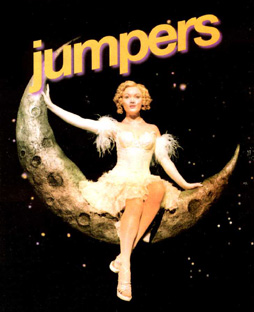 Let's begin by taking a look at some of the plays that graced New York
stages this season. One of the earliest was Manhattan Theatre Club's
production of Charlotte Jones's Humble Boy, but as was later
proved by the long-overdue New York premiere of Indian Ink at
Walkerspace in August, and by the vibrant Broadway revival of
Jumpers, no one does Tom Stoppard better than Tom Stoppard.
Let's begin by taking a look at some of the plays that graced New York
stages this season. One of the earliest was Manhattan Theatre Club's
production of Charlotte Jones's Humble Boy, but as was later
proved by the long-overdue New York premiere of Indian Ink at
Walkerspace in August, and by the vibrant Broadway revival of
Jumpers, no one does Tom Stoppard better than Tom Stoppard.
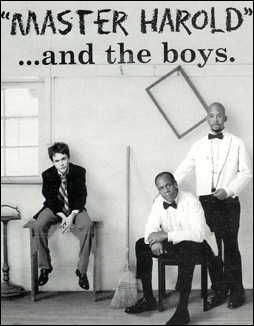 Many of the season's major productions of plays were revivals, and they
varied greatly in quality, from Roundabout's solid Broadway "MASTER
HAROLD"...and the boys. to the revelatory Far and Wide
at the Mint; from the pussy-footing Cat on a Hot Tin Roof, from
which only Ned Beatty emerged unscathed, to the overstuffed The
Caretaker; from the spotty Broadway Sly Fox to the
misguided botch of Twentieth Century, easily the least funny
revival (or revisal) of a comedy during 2003-2004. Entries like the New
Group's tart and biting Aunt Dan and Lemon and the Public
Theater's stellar, moving production of The Normal Heart were
far better examples of how to breathe new life into pre-existing works.
(Beckett/Albee was another attempt to do that, but that valiant
effort - despite featuring the incomparable Marian Seldes and Brian Murray -
didn't completely pay off.)
Many of the season's major productions of plays were revivals, and they
varied greatly in quality, from Roundabout's solid Broadway "MASTER
HAROLD"...and the boys. to the revelatory Far and Wide
at the Mint; from the pussy-footing Cat on a Hot Tin Roof, from
which only Ned Beatty emerged unscathed, to the overstuffed The
Caretaker; from the spotty Broadway Sly Fox to the
misguided botch of Twentieth Century, easily the least funny
revival (or revisal) of a comedy during 2003-2004. Entries like the New
Group's tart and biting Aunt Dan and Lemon and the Public
Theater's stellar, moving production of The Normal Heart were
far better examples of how to breathe new life into pre-existing works.
(Beckett/Albee was another attempt to do that, but that valiant
effort - despite featuring the incomparable Marian Seldes and Brian Murray -
didn't completely pay off.)
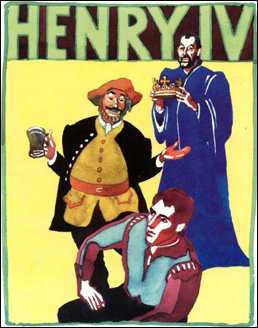 Shakespeare also had a banner season on Broadway, receiving not only a solid
production of Henry V in the Park and a rare mounting of
The Two Noble Kinsmen (both courtesy of the ever-reliable
Public Theater), but a vivid re-imagining of his two Henry IV
plays from adapter Dakin Matthews, and a conventional - but not unpleasing -
King Lear, both at Lincoln Center. Kevin Kline's Falstaff and
Christopher Plummer's Lear were two of the most effective (and affecting)
must-see performances of the year. While it's great to know that
Shakespeare can still bring out the best in people, Bill Irwin seemed to
have a similar magic touch with his season of plays at the Signature:
The Harlequin Studies and The Regard Evening were
superb realizations of Irwin's unique vision and voice, and Mr. Fox: A
Rumination was a highly admirable, if not wholly successful, effort.
Shakespeare and Irwin came off better this year than just about anyone else.
Shakespeare also had a banner season on Broadway, receiving not only a solid
production of Henry V in the Park and a rare mounting of
The Two Noble Kinsmen (both courtesy of the ever-reliable
Public Theater), but a vivid re-imagining of his two Henry IV
plays from adapter Dakin Matthews, and a conventional - but not unpleasing -
King Lear, both at Lincoln Center. Kevin Kline's Falstaff and
Christopher Plummer's Lear were two of the most effective (and affecting)
must-see performances of the year. While it's great to know that
Shakespeare can still bring out the best in people, Bill Irwin seemed to
have a similar magic touch with his season of plays at the Signature:
The Harlequin Studies and The Regard Evening were
superb realizations of Irwin's unique vision and voice, and Mr. Fox: A
Rumination was a highly admirable, if not wholly successful, effort.
Shakespeare and Irwin came off better this year than just about anyone else.
Shakespeare and Irwin aside, if you were at a great play in early 2004,
chances are it was Off-Broadway. In the span of about ten weeks, from early
February to mid-April, there was a string of truly remarkable new plays
Off-Broadway, each uniquely demonstrating the best of what New York theatre
has to offer. Any two of Valhalla, Bald Diva!,
Roulette, Bug, The Moonlight Room,
Wintertime, Small Tragedy, Well, and
Blackbird would make for a memorable Off-Broadway season, but
we got them all. A combination like this of such well-done comedies,
dramas, thrillers, conventional plays, and unconventional works just doesn't
come around every day (or every year).
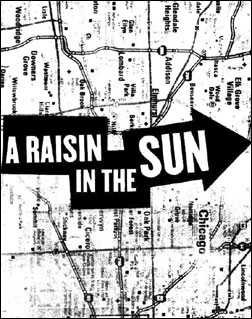 Betty Shamieh's Roar also opened during that time period, and
while terrific, it stands apart. It's a strong play on its own terms, but
it also held its own against the formidable Broadway production of A
Raisin in the Sun, one of the best revivals of a contemporary play
I've ever seen on Broadway or anywhere else. Each production had a
monumental central performance (Roar's in Sarita Choudhury,
Raisin's in Phylicia Rashad), strong supporting performances
(Roar's Sherri Eldin and Raisin's Sean Combs
notwithstanding), firm direction (from Marion McClinton and Kenny Leon), a
unique perspective on the American experience (from the Arab-American and
African-American viewpoints), and perceptive, incisive writing. I'm not
sure if Shamieh is the next Lorraine Hansberry, but she's a major
up-and-coming talent.
Betty Shamieh's Roar also opened during that time period, and
while terrific, it stands apart. It's a strong play on its own terms, but
it also held its own against the formidable Broadway production of A
Raisin in the Sun, one of the best revivals of a contemporary play
I've ever seen on Broadway or anywhere else. Each production had a
monumental central performance (Roar's in Sarita Choudhury,
Raisin's in Phylicia Rashad), strong supporting performances
(Roar's Sherri Eldin and Raisin's Sean Combs
notwithstanding), firm direction (from Marion McClinton and Kenny Leon), a
unique perspective on the American experience (from the Arab-American and
African-American viewpoints), and perceptive, incisive writing. I'm not
sure if Shamieh is the next Lorraine Hansberry, but she's a major
up-and-coming talent.
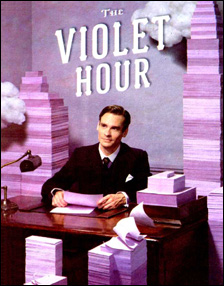 But for the most part, this season's new plays to be all over the map in
quality. Mary Zimmerman's The Notebooks of Leonardo Da Vinci
didn't live up to her Metamorphoses, and though The
Mysteries at Classic Stage Company tried its best, it couldn't live
up to either. Living Out, about the uneasy relationships
between parents and the nannies they hire, was a solid fall entry.
Omnium Gatherum and Recent Tragic Events were two
very different September 11 dramas, though only the former felt really
satisfying. The Retreat from Moscow was by turns insightful and
mawkish in dealing with the difficult topic of divorce, though Ben Chaplin
made an auspicious Broadway debut. At its best, Six Dance Lessons in
Six Weeks was predictable and insipid. The Long Christmas Ride
Home seamlessly melded Japanese Bunraku puppetry with a thoughtful
Paula Vogel script. MTC started its Broadway tenure with an uneven
production of Richard Greenberg's The Violet Hour and Regina
Taylor's witless, senseless re-thinking of The Seagull,
Drowning Crow. (MTC also presented a sure-fire hit in Neil
Simon's Rose's Dilemma that was never sure, was hardly a hit,
and never caught fire; let us all hope that Simon can still redeem himself,
and that this is not his last new play in New York.)
But for the most part, this season's new plays to be all over the map in
quality. Mary Zimmerman's The Notebooks of Leonardo Da Vinci
didn't live up to her Metamorphoses, and though The
Mysteries at Classic Stage Company tried its best, it couldn't live
up to either. Living Out, about the uneasy relationships
between parents and the nannies they hire, was a solid fall entry.
Omnium Gatherum and Recent Tragic Events were two
very different September 11 dramas, though only the former felt really
satisfying. The Retreat from Moscow was by turns insightful and
mawkish in dealing with the difficult topic of divorce, though Ben Chaplin
made an auspicious Broadway debut. At its best, Six Dance Lessons in
Six Weeks was predictable and insipid. The Long Christmas Ride
Home seamlessly melded Japanese Bunraku puppetry with a thoughtful
Paula Vogel script. MTC started its Broadway tenure with an uneven
production of Richard Greenberg's The Violet Hour and Regina
Taylor's witless, senseless re-thinking of The Seagull,
Drowning Crow. (MTC also presented a sure-fire hit in Neil
Simon's Rose's Dilemma that was never sure, was hardly a hit,
and never caught fire; let us all hope that Simon can still redeem himself,
and that this is not his last new play in New York.)
Frozen was a powerful but transitory play, Roundabout's
Intimate Apparel proved a multiple-award-winning hit at their
new Off-Broadway space, and Tim Robbins's satirical polemic
Embedded extended multiple times, even though almost no one who
saw it liked it. (I'm sure a lot of producers would love to know how that
was accomplished!) Big Bill, Beautiful Child, and
The Stendhal Syndrome had some good writing and a few sterling
performances, but never completely came together. All three, though, seemed
more effective than the Pulitzer Prize-winning Anna in the
Tropics, which didn't heat things up quite enough during its brief
Broadway stay. Neither were the flaccid Sixteen Wounded nor
Stephen Belber's Match around for long, but Frank Langella's
lithe performance as the dancer-choreographer Tobi in the latter will linger
in the memory for quite a while. So will Prymate, but for
different reasons: It's difficult to forget the scenes with Heather Tom
getting urinated on by - and later masturbating - the gorilla played by
André de Shields.
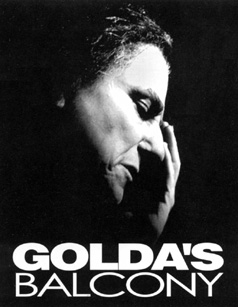 The season's one-person shows ranged from Theresa Rebeck's comic Bad
Dates at Playwrights Horizons starring the hilarious Julie White to
the serious I Am My Own Wife and Golda's Balcony.
Those two, starring Drama Desk Award winners Jefferson Mays and Tovah
Feldshuh respectively, transferred to Broadway, ended up even better after
their moves. And while there were a number of effective solo performances,
including the limited runs of the Sylvia Plath drama Edge
(starring Angelica Torn), Tom Gualtieri's stirring and funny one-man
interpretation of Macbeth called That Play, the
return engagement of John Leguizamo's Sexaholix, Sarah Jones's
sell-out hit bridge & tunnel, and Martin Moran's quietly
heartbreaking The Tricky Part, not all shows fared well. Ben
Gazzara couldn't make Nobody Don't Like Yogi particularly
likeable, and Yeardley Smith's highly anticipated More, was a
distancing disappointment that failed to bring you into the personal world
of the Simpsons star. And while Oldest Living
Confederate Widow... wasn't great, its star (Ellen Burstyn) was quite
good; she and the show deserved at least a slightly longer run than
the one performance they eked out at the Longacre.
The season's one-person shows ranged from Theresa Rebeck's comic Bad
Dates at Playwrights Horizons starring the hilarious Julie White to
the serious I Am My Own Wife and Golda's Balcony.
Those two, starring Drama Desk Award winners Jefferson Mays and Tovah
Feldshuh respectively, transferred to Broadway, ended up even better after
their moves. And while there were a number of effective solo performances,
including the limited runs of the Sylvia Plath drama Edge
(starring Angelica Torn), Tom Gualtieri's stirring and funny one-man
interpretation of Macbeth called That Play, the
return engagement of John Leguizamo's Sexaholix, Sarah Jones's
sell-out hit bridge & tunnel, and Martin Moran's quietly
heartbreaking The Tricky Part, not all shows fared well. Ben
Gazzara couldn't make Nobody Don't Like Yogi particularly
likeable, and Yeardley Smith's highly anticipated More, was a
distancing disappointment that failed to bring you into the personal world
of the Simpsons star. And while Oldest Living
Confederate Widow... wasn't great, its star (Ellen Burstyn) was quite
good; she and the show deserved at least a slightly longer run than
the one performance they eked out at the Longacre.
The Musicals
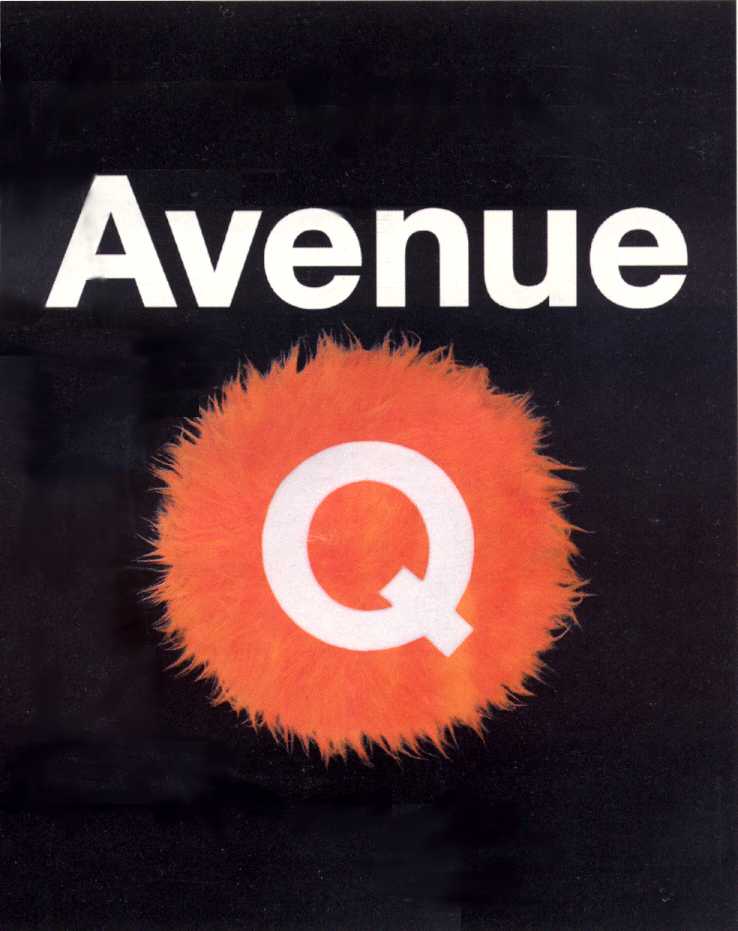 Perhaps not surprisingly, the season's musical selections were, on the
whole, weaker than its non-musical offerings. As producers continued their
pursuit of safe, saleable shows, most of the daring, intriguing work
couldn't be found in more conventional venues, and some shows good enough to
be bigger hits (like the intriguingly contemporary The Thing About
Men) didn't really get the notice they deserved. Others, like the
pleasant-enough Sesame Street take-off Avenue Q,
(which still thought it was on 15th Street even when it moved to Broadway's
Golden Theatre) got more than they should have, though, as of this writing,
Avenue Q has recouped its investment, which may presage better
things from its composers (Jeff Marx and Robert Lopez) and librettist (Jeff
Whitty) in the future.
Perhaps not surprisingly, the season's musical selections were, on the
whole, weaker than its non-musical offerings. As producers continued their
pursuit of safe, saleable shows, most of the daring, intriguing work
couldn't be found in more conventional venues, and some shows good enough to
be bigger hits (like the intriguingly contemporary The Thing About
Men) didn't really get the notice they deserved. Others, like the
pleasant-enough Sesame Street take-off Avenue Q,
(which still thought it was on 15th Street even when it moved to Broadway's
Golden Theatre) got more than they should have, though, as of this writing,
Avenue Q has recouped its investment, which may presage better
things from its composers (Jeff Marx and Robert Lopez) and librettist (Jeff
Whitty) in the future.
Much of the season's best work was done last summer, at the Midtown
International Theatre Festival and the New York International Fringe
Festival. Brian Lane Green composed some of the season's most sublime and
beautiful music for Waiting for the Glaciers to Melt, though
his miraculous score was wedded to a confusing, often impenetrable book.
Stephen Dolginoff's Thrill Me had no such problems, and nothing
all season quite matched the creepy creativity of this sell-out MITF hit
that chronicled the lives of Chicago "thrill killers" Leopold and Loeb. At
the Fringe, Stephen Sislen and Ben Winters's Slut was a
vivaciously clever adult musical comedy that could have transferred to a
commercial run with few alterations (and will hopefully arrive soon).
Cupid and Psyche wasn't part of either festival, but this early
fall entry was in the same league; this charming, miniature myth-based
musical comedy is also deserving of a longer life.
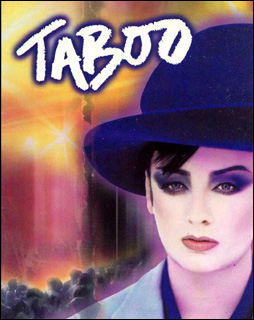 Most of the season's later new musicals didn't match what came earlier on;
misfires like the bewildering Wilder (nine words: "Loneliness
is automatic / When you live in an attic"), the jaw-dropping dystopian
Ministry of Progress, Open Heart (about which only
star Karla DeVito is particularly worthy of mention), or the one-joke
Johnny Guitar were, strangely, often the most interesting
offerings. bare aimed high, but didn't always hit its targets
- this pop opera about gay high-schoolers has some real potential, and is
scheduled to re-open this fall; a bit of rethinking and retooling could help
it be a huge hit. Another rock musical, Taboo, boasted a fine
Boy George score and a handful of excellent performances, but couldn't live
up to the hype given it by producer Rosie O'Donnell. Another heavily
promoted show did better, at least eventually: the Kushner/Tesori
Caroline, or Change lumbered about at the Public for an
extended winter run, but came to life with a bit of rewriting and recasting
for its spring Broadway engagement. Overall, however, a "B" musical (in
multiple senses) came the closest to really delivering the goods:
Bombay Dreams, a flimsy, marshmallow-light spectacle skewered
by many critics, unapologetically delivered more solid entertainment than
any other new Broadway musical this year.
Most of the season's later new musicals didn't match what came earlier on;
misfires like the bewildering Wilder (nine words: "Loneliness
is automatic / When you live in an attic"), the jaw-dropping dystopian
Ministry of Progress, Open Heart (about which only
star Karla DeVito is particularly worthy of mention), or the one-joke
Johnny Guitar were, strangely, often the most interesting
offerings. bare aimed high, but didn't always hit its targets
- this pop opera about gay high-schoolers has some real potential, and is
scheduled to re-open this fall; a bit of rethinking and retooling could help
it be a huge hit. Another rock musical, Taboo, boasted a fine
Boy George score and a handful of excellent performances, but couldn't live
up to the hype given it by producer Rosie O'Donnell. Another heavily
promoted show did better, at least eventually: the Kushner/Tesori
Caroline, or Change lumbered about at the Public for an
extended winter run, but came to life with a bit of rewriting and recasting
for its spring Broadway engagement. Overall, however, a "B" musical (in
multiple senses) came the closest to really delivering the goods:
Bombay Dreams, a flimsy, marshmallow-light spectacle skewered
by many critics, unapologetically delivered more solid entertainment than
any other new Broadway musical this year.
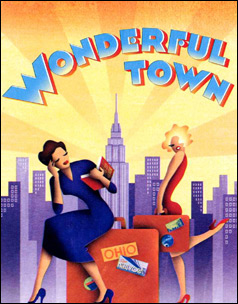 But this season, like so many recent seasons, was filled with revivals.
Some, like the Broadway Wonderful Town, the City Opera
Sweeney Todd, and the Irish Rep's Off-Broadway Finian's
Rainbow were sterling examples of how to make older shows seem fresh
with a minimum amount of unnecessary tinkering. Others, like the
misbegotten Fiddler on the Roof and Little Shop of
Horrors, went out of their way to avoid imitating their original (and
successful) incarnations, and met with only limited artistic success. The
Roundabout/Deaf West production of Big River couldn't make that
mediocre show good, but the mixing of hearing and non-hearing actors
resulted in a one-of-a-kind theatre experience that seemed more than the sum
of its parts. The Off-Off-Broadway First Lady Suite was a
starry affair featuring a dazzling array of talented performers, but some
earth-bound direction kept the show from completely taking flight.
But this season, like so many recent seasons, was filled with revivals.
Some, like the Broadway Wonderful Town, the City Opera
Sweeney Todd, and the Irish Rep's Off-Broadway Finian's
Rainbow were sterling examples of how to make older shows seem fresh
with a minimum amount of unnecessary tinkering. Others, like the
misbegotten Fiddler on the Roof and Little Shop of
Horrors, went out of their way to avoid imitating their original (and
successful) incarnations, and met with only limited artistic success. The
Roundabout/Deaf West production of Big River couldn't make that
mediocre show good, but the mixing of hearing and non-hearing actors
resulted in a one-of-a-kind theatre experience that seemed more than the sum
of its parts. The Off-Off-Broadway First Lady Suite was a
starry affair featuring a dazzling array of talented performers, but some
earth-bound direction kept the show from completely taking flight.
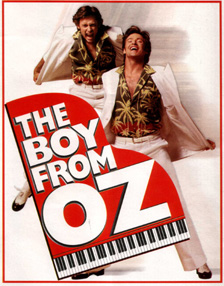 The Boy From Oz wasn't really a revival, but its tired book and
familiar score made it seem like it was. Nonetheless, Hugh Jackman made the
most of his Broadway debut, and gave the season's most energetic and
charismatic leading performance. No one came close to matching Jackman's
unstoppable star quality, certainly not Noah Racey and Nancy Lemenager of
Never Gonna Dance; if their stage presence had equaled the
technical proficiency of their dancing Jerry Mitchell's choreography, it's
possible the middling show packed with classic Jerome Kern songs might have
lasted a bit longer. David Friedman's Listen to My Heart was
little more than a revue of the composer's songs, but managed to be more
moving and inherently musical than most of the season's other
cobbled-together shows, but Barbara Cook's Broadway, a flat-out
concert, was better still, catapulted into the stratosphere by its
incandescent star.
The Boy From Oz wasn't really a revival, but its tired book and
familiar score made it seem like it was. Nonetheless, Hugh Jackman made the
most of his Broadway debut, and gave the season's most energetic and
charismatic leading performance. No one came close to matching Jackman's
unstoppable star quality, certainly not Noah Racey and Nancy Lemenager of
Never Gonna Dance; if their stage presence had equaled the
technical proficiency of their dancing Jerry Mitchell's choreography, it's
possible the middling show packed with classic Jerome Kern songs might have
lasted a bit longer. David Friedman's Listen to My Heart was
little more than a revue of the composer's songs, but managed to be more
moving and inherently musical than most of the season's other
cobbled-together shows, but Barbara Cook's Broadway, a flat-out
concert, was better still, catapulted into the stratosphere by its
incandescent star.
It must also be mentioned that the City Center Encores! series continued its
mission of presenting unfamiliar, underappreciated shows with their weekends
of the seldom-heard Can-Can and the seldom-produced Bye
Bye Birdie. (Okay, okay, and the highly entertaining - and
truly neglected - Pardon My English.) Glen Roven's
Singular Sensations series lasted only three weeks, and we only
got to see a few of the stars he'd arranged to speak (and sing) of their
life stories, but Carol Channing, Donna McKechnie, and Florence Henderson
can still put on great shows. And if you missed any of Scott Siegel's
Broadway by the Year concerts, you missed some of the
best-performed and most affecting tributes to the show tunes of yesteryear.
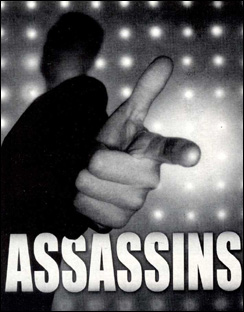 Stephen Sondheim's only Broadway entry this year was the Roundabout's
revival of Assassins, which boasted a few strong performances,
but a production that didn't know how to support them. Still, the
much-revered composer made headlines when his new musical
Bounce stalled after Washington, D.C. and a planned Actors'
Fund concert of the show was scuttled at the last minute. If you didn't see
it, you didn't miss much, and you probably can't count on a New York
mounting any time soon. The experience of Bounce can easily be
approximated, though: listen to 20 random tracks from CDs of
Follies, Pacific Overtures, Merrily We Roll
Along, and Assassins, and play Sweeney
Todd's "By the Sea" once at the beginning, once in the middle, and
once at the end. (Sure, you can also listen to the Bounce cast
recording, but the music's better this way.)
Stephen Sondheim's only Broadway entry this year was the Roundabout's
revival of Assassins, which boasted a few strong performances,
but a production that didn't know how to support them. Still, the
much-revered composer made headlines when his new musical
Bounce stalled after Washington, D.C. and a planned Actors'
Fund concert of the show was scuttled at the last minute. If you didn't see
it, you didn't miss much, and you probably can't count on a New York
mounting any time soon. The experience of Bounce can easily be
approximated, though: listen to 20 random tracks from CDs of
Follies, Pacific Overtures, Merrily We Roll
Along, and Assassins, and play Sweeney
Todd's "By the Sea" once at the beginning, once in the middle, and
once at the end. (Sure, you can also listen to the Bounce cast
recording, but the music's better this way.)
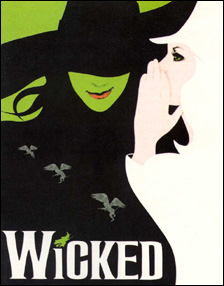 The exact nadir of the season is difficult to pinpoint, but two of the
strongest candidates both opened in late 2003, one on Broadway and one
Off-Broadway. Wicked, a feckless, substance-free adaptation of
Gregory Maguire's atmospheric riff on L. Frank Baum's Oz
stories, boasted a barely listenable score by the once-reliable Stephen
Schwartz, with music lacking melody and lyrics lacking depth, and a book (by
Winnie Holzman) that panders to the lowest common denominator in a way even
the creators of Mamma Mia! must envy. Of course, this was the
season's runaway hit. Even worse was the Off-Broadway The Musical of
Musicals -- The Musical: creators Eric Rockwell and Joanne Bogart took
a rich comic idea about spoofing the writing styles of Golden-Age composers
and crafted a two-hour series of jokes as deficient in wit, humor, and
insight as the accompanying music was in parodistic creativity. Perhaps the
most unbearable show of the year, its inexplicable success is leading to a
full season of York Theatre Company in shows in 2004-2005, and anything that
fosters the creation of three new musicals can't be all bad.
The Musical of Musicals, however, came frighteningly close.
The exact nadir of the season is difficult to pinpoint, but two of the
strongest candidates both opened in late 2003, one on Broadway and one
Off-Broadway. Wicked, a feckless, substance-free adaptation of
Gregory Maguire's atmospheric riff on L. Frank Baum's Oz
stories, boasted a barely listenable score by the once-reliable Stephen
Schwartz, with music lacking melody and lyrics lacking depth, and a book (by
Winnie Holzman) that panders to the lowest common denominator in a way even
the creators of Mamma Mia! must envy. Of course, this was the
season's runaway hit. Even worse was the Off-Broadway The Musical of
Musicals -- The Musical: creators Eric Rockwell and Joanne Bogart took
a rich comic idea about spoofing the writing styles of Golden-Age composers
and crafted a two-hour series of jokes as deficient in wit, humor, and
insight as the accompanying music was in parodistic creativity. Perhaps the
most unbearable show of the year, its inexplicable success is leading to a
full season of York Theatre Company in shows in 2004-2005, and anything that
fosters the creation of three new musicals can't be all bad.
The Musical of Musicals, however, came frighteningly close.
In Memoriam
No accounting of the season would be complete without a tribute to a few of
the people that passed away during the year. While by no means a complete
list, among those who made significant contributions to the world of theatre
and died during the course of the 2003-2004 season are: Dame Wendy Hiller,
Rachel Kempson, Martha Scott, Gregory Peck, Hume Cronyn, Joseph Chaikin,
Katharine Hepburn, Buddy Hackett, Buddy Ebsen, Elisabeth Welch, Eileen
Rodgers, Mike Salinas, Elliot Norton, Bob Hope, Luther Henderson, Gregory
Hines, William Roy, John Ritter, Herb Gardner, Elia Kazan, Rex Robbins,
Donald O'Connor, Florence Stanley, Janice Rule, Art Carney, Dorothy Loudon,
Lewis M. Allen, Alan Bates, Isabelle Stevenson, Gerald Gutierrez, Earl
Hindman, Uta Hagen, Ann Miller, Charles Brown, Jason Raize, Spalding Gray,
Ray Stark, Mary Bryant, Carl Anderson, John Randolph, Jerome Lawrence, Paul
Winfield, Mercedes McCambridge, Victor Argo, and Peter Ustinov.
Conclusion
In what was successful and what wasn't, in what ran and what didn't, and in
the countless surprises and plot twists that seemed to mount with every
passing week, it seems as though the year that just ended was an unexpected
bounty for those who deeply care about, participate in, or simply follow the
wild, wacky world of New York theatre. So, it would seem that only one word
capable of adequately defining the 2003-2004 season is "theatrical." I'm
not sure I could think of a better compliment.
|
